Lock changes for landlords
If you own a holiday let property, you should be well aware of the new fire regulations that suddenly hit last summer. I know many of you have been spending all your profits to ensure your properties are up to scratch for the coming season.
But what about long term lets?
Well, if you read the fire risk assessment that has to be carried out by holiday let owners, it states “any property you pay to stay in.” If that doesn’t already mean long term lets, then it certainly will if the government of the day decides that the measures taking place with holiday lets are a success. After all, the more they make you spend, the more they get in tax.
If you own properties that you let out to tenants, then it might be an idea to get ahead of the curve. Locks are being changed all the time through abuse, lost keys, evicted tenants, etc. What better time than now to make sure that the new locks going in are keyless escape versions. In the event of a fire, your tenants can get out quickly without having to find keys in a panic situation?
AC Locksmiths Norfolk can change your locks for you, We will ensure that all replacements are kite marked products, so all insurances will be valid.
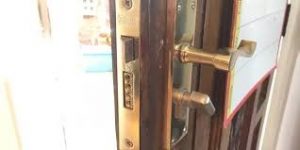
But while thumb turn (escape) locks are great for getting out easily, they can be a reduction in your security. There are tools that can go in through letterboxes and rotate the inner thumb turns, it is important to consider options to cancel this short fall. Letter catching cages are a great remedy to this, or mounting a post box outside your house, while disabling any door positioned letter plates is even better.
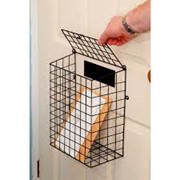
Changes are coming. I have spoken to several holiday let owners who have changed locks recently, only to have to change them again in light of the new legislation. It’s worth thinking about being ready for the inevitable.
Any questions regarding the above, please do not hesitate to contact me through any of my contact methods. https://www.ac-locksmiths-norfolk.co.uk/contact-us-here/
Thanks for reading.
Holiday let owners – are you aware of holiday let and keyless exit point regulations?
In light of the new self assessment fire regulations for owners of holiday lets, here are some things I have noticed people getting wrong:
Firstly, your front door and back door may not be the only fire escapes. If you are in a room with French doors and the fire is the other side of the interior doors, then the French doors are your exit point. Every final exit door is a fire exit and therefore every final exit door must me converted to keyless escape.
Secondly, if you have a porch, the inner door must either be converted as well or left unlockable by the customers. This can be as simple as taking away that key. Alternatively, convert the inner door and remove the key for the outer porch. Either way, the entire route must be keyless escape to meet the keyless exit point regulations.
Finally, this conversion is a serious impact on security. There are tools available that can come in through the letterbox and rotate the thumb turn/push the lever. As these are your holiday lets, I doubt you get much worthwhile mail, so either invest in a letterbox guard, letter collecting basket or seal off the letter box and put a posting box on the wall outside.
So what does the conversion to keyless exit point regulations consist of?
Well, if you have a door with a lift handle mechanism then it simply means changing your double key cylinder for a key and turn cylinder
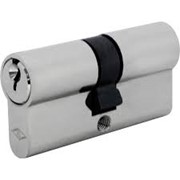
Double key cylinder
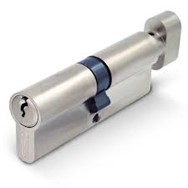
Key & turn cylinder
Prices start from £55, although I see no reason to go for high spec when you are making life easy for the burglar under these new regulations.
If you have a wooden door, you are turning this 
 into this
into this
On wooden doors, you also have the option to install a kite marked nightlatch /Yale type lock
If you need me to come and do a keyless escape conversion for you, please book a free assessment/measure up where I will give you a final no obligation quote and book you for fitting at the next convenient date. Most work can be carried out during changeover days.
Landlord lock law change:
I have just been reading through the Home Office Document: ‘A guide to making your small paying-guest-accommodation safe from fire.’ A guide to compliance with fire safety law for those responsible for safety in small paying-guest-accommodation’
You can find the document here
Note this says fire safety law and therefore is the legal requirement of all landlords, certainly for those with holiday lets. I would argue long term tenants are also paying guests as they have no right to remain when a landlord decides they want their property back for any reason.
Speaking to a letting agency recently, I have also discovered that it will be expected of all landlords to read the document and comply with all points mentioned. You won’t always get a risk assessor to check things for you. You, as the landlord are entirely responsible should a fire break out. It is quite heavy reading and most of it is obvious, but it is my job to point out relevant issues to my own line of work.
In section 6, there is this statement:
‘Exit doors, such as the front or back door, should always be easy to unlock and must not need a key to unlock them from the inside. A simple latch or thumb turn is usually good enough. However, you may need to consider whether all guests are able to open these doors. A simple single action turn handle or lever will often be more appropriate.’
This means you must have a lock with a thumb turn on the inside. Something like this:
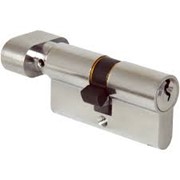
On all upvc type doors, this is simply a matter of changing the cylinder. On doors with mortice (often called ‘Chubb’ type) locks, you will need to change the lock, handles and purchase a cylinder. And while thumb turns are great for fire escapes, they do pose a security risk as it is possible with certain tools to go in through the letterbox and rotate the thumb turn to gain access. Therefore any locks with thumb turns on a door with a letter plate, should also purchase a letter plate guard to alleviate this problem.
The point is repeated on the checklist included in the document: ‘Are frequent checks carried out to ensure exit routes are kept clear and fire exits remain easily openable?’
That is your prompt to make sure no one can lock a door, remove the key and then be unable to get out while panicking in a fire.
October the 1st is the current date for this to become law over advice.
If you have your work done through AC Locksmiths Norfolk, you can expect to pay £55 for a kite marked thumb turn euro cylinder. These can be brass/gold, chrome, polished chrome, dual finish, black or white. An average of £50 to replace your mortice lock with a mortice euro lock case. Handles start at £25 but average at £45. More ornate handles such as wrought iron up to £200. In all cases, a labour fee of £75 is payable. (All prices correct at time of writing, but please get binding quote at measuring stage). In almost all instances, a measuring visit will be required. This is free to all properties within a half hour drive of Holt, Norfolk.
Should you have any questions regarding the above information, please do not hesitate to contact me; 07846643176
Thanks for reading.
New laws implemented for holiday lets
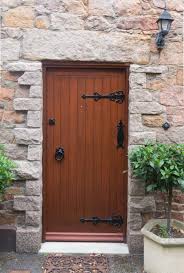
Very soon, all holiday let properties are going to be required by law to be keyless exit in case of emergencies. For properties with UPVC or similar doors where the handle needs to be pushed up before locking, the lock changes are straight forward and the existing cylinder just needs to be changed for one that has a thumb turn on the inside rather than a key.
But if you have a wooden door with a mortice (Chubb type) lock, then you will need a complete conversion kit consisting of replacement lock case, thumb turn cylinder and Euro cylinder handles. Most of this is straight forward, but sourcing handles to match your existing ones can be a drain.
If you do not get this work done and your tenants have an emergency, there will be no cover from your insurance should the worst happen due to them not being able to escape.
Here at AC Locksmiths Norfolk, we are happy to work around your changeover days and with your management company to get the locks changed seamlessly without hassle for you or your customers.
Should you require any more information, please contact me for an informal chat.
It is well known that business properties, especially where the public has access, should have secure fire exit doors, which means that all locked doors should be able to be opened from the inside without a key.
But many people renting out properties for holidays do not realise that these fire exits should have easy escape capabilities. The logic behind this is that if the lock is key operated on the inside, the customers may well lock the door, put the key somewhere safe, and then should the worst happen and a fire break out, in their panic and being away from home, they could well forget where they have put the key and be caught in a tragic accident.
So if your wooden door has a nightlatch (often called a ‘Yale’ lock), and that lock has a British Standard Kite mark, you are fine.
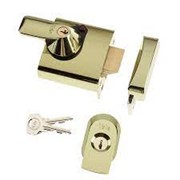
If your wooden door has a mortice (often called a ‘Chubb’ lock), with key operation on both sides, there is a conversion that can be done to use a Euro Cylinder that has a thumb turn on the inside. This means changing the lock and handles but can use the existing space with minimal visible change.
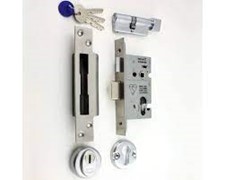
If your door is UPVC or has any mechanism where the handles must be lifted before locking, it is a simple matter of swapping the existing Euro Cylinder for one with a thumb turn on the inside.
This is a key both sides Euro Cylinder: 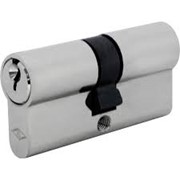
And this is a standard thumb turn Euro Cylinder: 
There is a slight worry with installing these fire escape systems, though and that is I have a tool that can go in through letter boxes and turn the thumb turn allowing me access to the property. We have two solutions. Firstly, certain thumb turns on the very best cylinders are designed to be difficult for tools to turn. They might require a push while turning or just plain difficult for the tool to purchase.
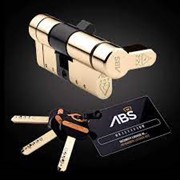
Alternatively, you can buy specially designed sloped guards for your letterbox (although even these can be bypassed with ever more clever locksmith tools).
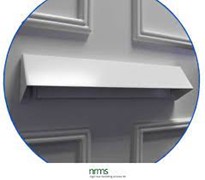
Or better yet a letter catching cage on the back of your door will stop all tools that I know of at time of writing.

If you own or run holiday lets, you might find your public liability insurance does not pay out if you have not taken the correct measures to ensure the safety of your guests.
I am noticing a lot of village halls are also suddenly finding out from fire inspections that they are not up to scratch. Please check the regulations specific to you if you run any property that is not a private home.
Click here for Government guidance on fire doors/fire safety
Should you have any questions regarding the above information, please do not hesitate to contact me.
Thanks for reading.














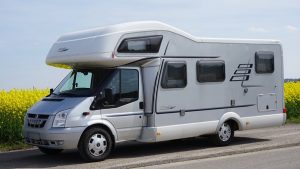
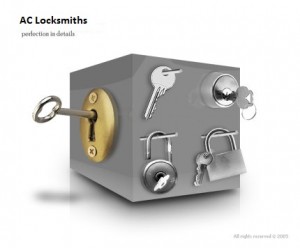











 I therefore urge holiday let owners to have regular security checks and lock services. And holiday makers, check that your cottage does have adequate locks. You are quite within your rights to have a safe and secure home to live in for the duration of your stay.
I therefore urge holiday let owners to have regular security checks and lock services. And holiday makers, check that your cottage does have adequate locks. You are quite within your rights to have a safe and secure home to live in for the duration of your stay.